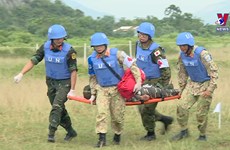Seeking an end to tuberculosis
"Vietnam needs more political commitment
to release financial and human resources to minimise tuberculosis (TB)
cases and eliminate the disease by 2030," said Vice Minister of Health
Nguyen Thi Xuyen.
Xuyen was speaking at a workshop on TB
prevention held by the Party Central Committee's Commission for
Popularisation and Education and the Ministry of Health (MoH) on March
22.
A TB survey conducted in 2006 by the MoH revealed that
the rate of TB cases was 145/100,000 in Vietnam, higher than the
previous World Health Organisation estimate of 109/100,000. However, the
health sector only managed to treat around 60 percent of TB patients
due to a lack of human resources, especially at local levels.
Health sector statistics showed that the current number of doctors who
specialise in TB prevention is 1.58/100,000 compared with the general
practitioner rate of 12/100,000. There could be a shortage of staff
involved in TB prevention for a number of reasons, including a high risk
of infection, low income and even discrimination.
Director of the National Lung Hospital Dinh Ngoc Sy said that many
provinces haven't given due attention to TB prevention, leaving many TB
patients misdiagnosed or unreported, putting them at risk of spreading
the infection in their communities.
A representative from
the TB and Lung Diseases Hospital of central Ha Tinh province
said that there was a TB staff shortage at provincial and district
levels because there was no preferential policy for staff working in the
field other than an allowance equal to 35 percent of the minimum wage.
The TB and Lung Diseases Hospital of central Da Nang city
revealed that it had been unable to hire a TB doctor for the past 10
years because no one wanted the job.
The National TB
Prevention Programme estimated that Vietnam needed to mobilise an
additional 258 million USD to supplement the 340 million USD from State
and provincial budgets, and international support for TB prevention
during the 2011-15 period.
Successful detection and treatment of TB were vital in the fight to prevent the disease in Vietnam, said Sy.
He stressed that the political system should give priorities for TB
prevention in the coming years with an aim to strengthen the health
system with sufficient numbers of capable human resources, financing and
techniques.
The health sector should train more staff to
fill the human resource gap in TB prevention as well as mobilise private
medical units into the fight against TB. The health sector's TB
prevention system and community awareness of TB prevention should also
be strengthened at all levels with an aim to provide available access to
TB patients, said Sy.
According to the National Programme
for TB Prevention, TB prevalence was still a pressing problem inVietnam
which currently ranks 12 out of 22 countries struggling with TB
prevention throughout the world.
In 2009, more than 98,000
cases of TB were reported inVietnam, including more than 51,000 new
patients and 26,000 people seeing reoccurring cases. Each year, the
health sector successfully treats more than 91 percent of patients who
are detected with the disease.
The World Health
Organisation said that there were more than 9 million cases of TB
reported across the world each year, leading to 2 million deaths.
Between 95-98 percent of TB cases occurred in developing countries and
75 per cent hit people who were at a working age./.













